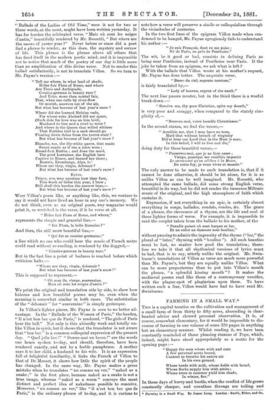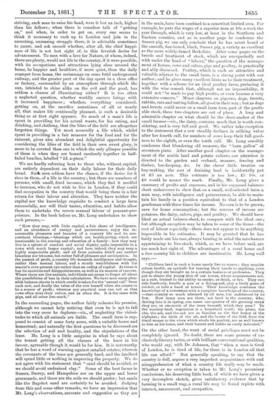FARMING IN A SMALL WAY.*
Tuts is a capital treatise on the cultivation and management of
a small farm of from thirty to fifty acres, abounding in clear- headed advice and shrewd personal observation. It is, of course, somewhat elementary, for it would be impossible to dis- course of farming in one volume of some 370 pages in anything but an elementary manner. Whilst reading it, we have been constantly reminded of those pleasing stanzas of Pope, which, indeed, might have stood appropriately as a motto for the opening page :—
" Happy the man whose wish and care
A few paternal acres bound, Content to breathe his native air In his own ground.
Whose herds with milk, whose fields with bread, Whose flocks supply him with attire ; Whose trees in summer yield him shade, In winter, fire."
In these days of hurry and bustle, when the conflict of life grows constantly sharper, and countless throngs are toiling and
• Farming in a Small Way. By James Long. London : Smith, Elder, and 00.
striving, each man to raise his head, were it but an inch, higher than his fellows ; when there is ceaseless talk of "getting on," and when, in order to get on, every one seems to think it necessary to rush up to London and join in the unresting, unceasing struggle there, it is advisable sometimes to pause, and ask oneself whether, after all, the chief happi- ness of life is not lost sight of, in this feverish desire for advancement. To men with a love for Nature, of whom, indeed, there are plenty, would not life in the country, if it were possible, with its occupations and attractions lying close around the home, be happier and healthier, if more quiet, than the daily scamper from home, the scrimmage on some fetid underground railway, and the greater part of the day spent in a close office or factory, surrounded by an atmosphere through which the sun, intended to shine alike on the evil and the good, has seldom a chance of illuminating either ? It is too often a neglected question, whether worldly success brings with it increased happiness ; whether, everything considered, getting on, at the sacrifice sometimes of all or nearly all, that makes life continually pleasant, is such a desirable thing as at first sight appears. So much of a man's life is spent in providing for his actual wants, for his eating, and drinking, and clothing, that the lilies of the field are altogether forgotten things. Yet most assuredly a life which, whilst spent in providing in a fair measure for the food and for the raiment, gives also abundant and delightful opportunity for considering the lilies of the field in their own sweet glory, is more to be coveted than one in which the only glimpse possible of them is when they are bound carelessly together in half- faded bundles, labelled " 2d. a-piece."
We are hardly referring here to those who, without capital, are entirely dependent on their daily labour for their daily bread. Such men seldom have the chance, if the desire for it rises in them, of a life in the country ; but there are numbers of persons, with small, fixed incomes, which they find it needful to increase, who do not wish to live is London, if they could find occupation in the country that would bring them in a fair return for their labour and attention. They have neither the capital nor the knowledge requisite to conduct a large farm successfully, nor will their tastes, education, and habits allow them to undertake the severe manual labour of peasant-pro- prietors. In the book before us, Mr. Long undertakes to show such persons,-
" How they may, with little capital, a fair share of intelligence, and an abundance of energy and perseverance, enjoy the in- numerable pleasures and luxuries of a country life and its con- comitant blessings,—blessings which are health-giving, which are inestimable in the rearing and education of a family—how they may live in a sphere of comfort and social dignity quite impossible in a town with much larger capital ; and how, indeed, they may reap a highly respectable profit, and all from pursuits which are neither laborious nor irksome, but rather full of pleasure and anticipation. In the pursuit of profit, a country life demands intelligence and thought, rather than manual labour, and a steady watchfulness with the master's ever-present eye rather than an outlay of capital. At times it has its anxieties and disappointments, as well as its seasons of success. Where there are live animals, individuals are prone to forget all about the possibilities of loss in their calculations. We have seen many plea- Bible balance-sheets in which credit is taken for the ' annual calf' from each cow, and finally the value of the cow herself when she ceases to be a source of profit; whereas any practical man can tell us that cows often miss their calves, and as often die. It is the same with pigs, and all other live-stock."
In the succeeding pages, the author fairly redeems his promise, although we cannot help noticing that even he is apt to fall into the very error he deplores—viz., of neglecting the vicissi- tudes to which all animals are liable. The small farm is sup- posed to consist of some forty acres, with a suitable house and homestead ; and naturally the first questions to be discussed are the selection of soil and locality, and the stipulations of the lease. Mr. Long is a little sanguine in what he says about the tenant getting all the clauses of the lease in his favour, agreeable though it would be for him. It is noteworthy that he has a word of warning against entailed estates, whereon the covenants of the lease are generally hard, and the landlord will spend little or nothing in improving the property. We do not agree with his statement that " sand should be avoided, as we should avoid undrained clay." Some of the best farms in Sussex, Surrey, and Hampshire are on the upper and lower greensands, and these are the soils we should prefer ; but sands like the Bagshot sand are certainly to be avoided. Judging from this and some other remarks, we have an impression that Mr. Long's observations, accurate and suggestive as they are in the main, have been confined to a somewhat limited area. For example, he puts the wages of a superior man at 16s. a week the year through, which is very low, at least in the Southern and Eastern counties, and as in another page he condemns the Sussex pig, we can only conclude that he has never heard of the smooth, fine-boned, black, Sussex pig, a variety as excellent as the more widely-famed Berkshire. After some pages on the- breeds and treatment of stock, which are unexpectedly met with under the head of " labour," the question of the manage- ment of horses, cows and calves, pigs and poultry, is practically and ably discussed. Poultry, which is such an attractive and valuable adjunct to the small farm, is a strong point with our author; and he gives many excellent hints as to their treatment,. together with a scheme for an ideal poultry farm, prefacing it with the wise remark that, although not an impossibility, it could not " be made to pay high profits, or even become a very extensive concern." Minor chapters on pigeons, dogs, ferrets,. rabbits, rats and ratting follow, all good in their way ; but as dogs and ferrets could never on a small farm form part of the profit- able stock, these two chapters are out of place. A long and admirable chapter on what should be the sheet-anchor of the small farmer—viz., the dairy, contains much that is worth con- sidering, and is very full and good. We rather take exception to the statement that a cow steadily declines in milking value after her fourth calf, for numbers of cows keep their full good- ness to the eighth, or even the tenth calf. Mr. Long sensibly condemns that blundering old measure, the " barn gallon" of seventeen pints. After another good chapter on the manage- ment of the arable land and potato culture, our attention is: directedto the garden and orchard, manure, fencing and timber, bee-keeping, &c. In the clever little treatise on hay-making, the cost of draining laud is incidentally put at £3 an acre. This estimate is too low ; £5 10s. or £6 would be nearer the mark. Finally, Mr. Long gives a summary of profits and expenses, and in his supposed balance- sheet endeavours to show that on a small, well-selected farm a man may, with intelligence and perseverance, be able to main- tain his family in a position equivalent to that of a London gentleman with three times his income. No corn is to be grown,. save for home consumption ; but the sources of income are- potatoes, the dairy, calves, pigs, and poultry. We should have• liked an actual balance-sheet, to compare with the ideal one ; but although exception may be taken to some of the items—the cost of labour especially—there does not appear to be anything impossible in his estimates. It may be granted that he has fairly made out his case, always bearing in mind the mischances appertaining to live-stock, which, as we have before said, are too much lost sight of. The advantages of a rural home and a free country life to children are inestimable. Mr. Long welt says :—
" Children bred in such a home rarely live to starve ; they acquire robust health, an aptitude for turning their hands to anything, even, though they are brought up to a certain business or profession. They put to shame the young men of our towns, whose acquirements are, as a rule, limited to the ability to smoke, or drink, or bet. They can ride fearlessly, handle a gun or a fishing-rod, play a lively game of cricket, or take a hand at tennis. Their knowledge combines the knowledge of a townsman with a complete knowledge of the country, —that country so much admired by all men, but understood by so few. How many men are there, not bred in the country, who, driving into it in spring, can name one-quarter of the growing crops they see, or one-tenth of the trees beneath which they pass P To the country-bred, vegetation is a household word ; the plane, the elm, the ash, and the oak are as familiar as the first lesson in the alphabet ; the birds of the air, and the beasts of the field, from the timid mouse to the vixen which steals his poultry, are as well known to him as his home, and their haunts and habits as easily indicated.'
On the other hand, the want of social privileges must not be completely ignored. No doubt, there are some persons of ex- clusively literary tastes, or with brilliant conversational qualities,. who would say, with Dr. Johnson, that " when a man is tired of London, he is tired of life, for there is in London all that life can afford." But generally speaking, to say that the country is dull, argues a very imperfect acquaintance with and misapprehension of what a country life really may be made. Whether or no exception is taken to Mr. Long's pecuniary conclusions, his deserving little book, of which we have given a very incomplete sketch, gives satisfactory evidence that by farming in a small way, a rural life may be found replete with interest, amusement, and occupation.







































 Previous page
Previous page